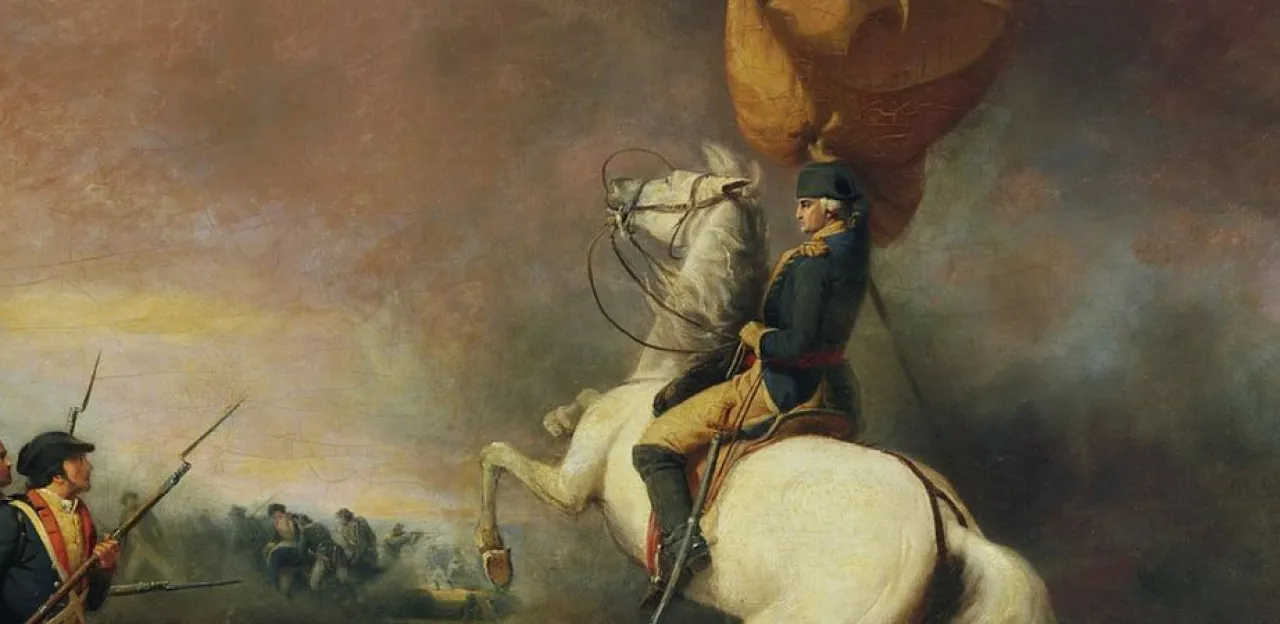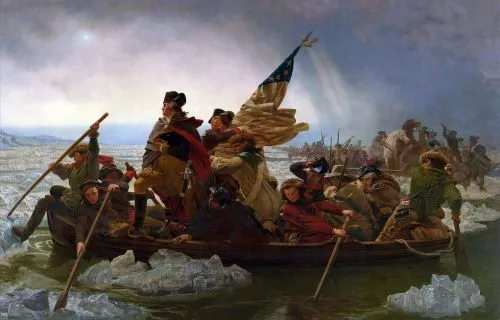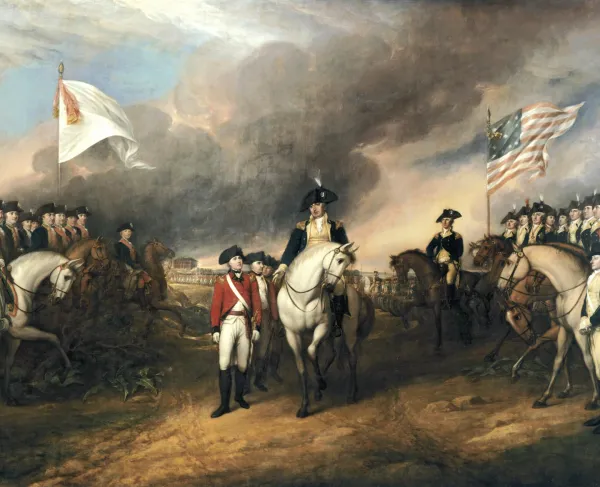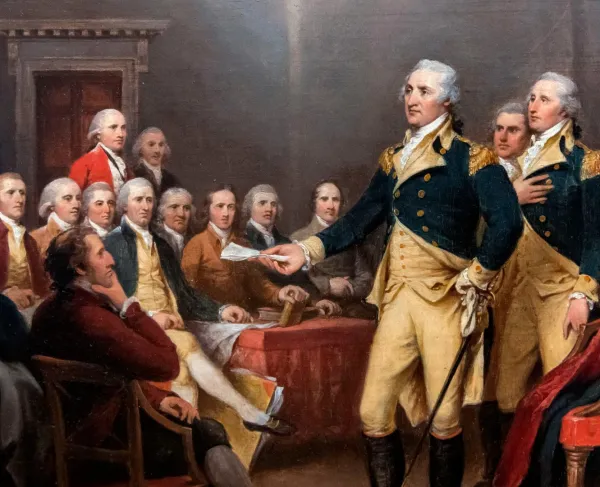The Ten Crucial Days

While there have been many pivotal moments in American history, perhaps no stretch of days comes close to signifying how perilous the situation was for American soldiers, and that of the very idea of the United States itself. Coming off the humiliating defeats at Brooklyn Heights and the New York City area in late summer of 1776, Gen. George Washington’s Continental army limped across New Jersey to find shelter for the coming winter months. The American army, which numbered nearly 14,000 troops in August, had dwindled to under 5,000 by late November. What soldiers hadn’t been killed or captured simply walked away from the Patriot Cause. And the threat of more deserters was eminent. Enlistments during the war were provisional, and many were for no more than a year. On January 1, many of Washington’s men would no longer be obligated to fight. And many of them had decided they had done enough for the cause of liberty. Morale was at an all time low. Badly in need of supplies and winter clothing, the soldiers that took refuge on the Pennsylvania banks of the Delaware River in December 1776 had little optimism to continue fighting.
Thomas Paine, author of Common Sense, was with the Continental army at this time, and penned his thoughts in what became known as The American Crisis. The opening lines, “These are the times that try men's souls: The summer soldier and the sunshine patriot will, in this crisis, shrink from the service of his country; but he that stands it now, deserves the love and thanks of man and woman....,” would become synonymous with American resolve and sacrifice. Washington had it read to his soldiers in hopes of encouraging them. The commander in chief also knew that a decisive attack on the British outposts in New Jersey might be what was needed to save the Revolution from complete collapse. Sensing the peril that he was in, Washington confided in a letter to his brother that unless some miraculous feat occurred, “the game is pretty much up.”

In the early morning hours of December 26, detachments of the Continental army crossed the ice-choked Delaware River to land on the frozen, snow-covered banks in New Jersey. A relentless storm of sleet and wind overnight made navigation nearly impossible. It is said that artillery commander Henry Knox’s bellowing voice could be heard directing the boat launches. The regiments with Washington made it across; other detachments further south had no such luck. No matter, the plan had been set. “Victory or Death” were the last words Washington wrote in his tent before departing. The Americans came upon the sleepy town of Trenton, a British outpost occupied by about 1,000 Hessian troops. American folklore has long said the Hessians were drunk from the previous night’s Christmas celebrations, but this is not accurate. The Americans descended from the northwest around 8am, and fighting took place through the streets. Artillery was set up on the northern fork of two major roads and proceeded to push the Hessians back. A pitched charge followed, and the Americans drove the Hessians into a nearby apple orchard where they surrendered. Hessian commander, Johann Rall, was mortally wounded. It is said that a message was later found in his coat pocket that was addressed December 24, and warned of an imminent American attack. Rall, however, dismissed the notion, and the urgency of George Washington and his troops.
The Americans took Trenton, and then promptly retreated back over the Delaware River into Pennsylvania. British reinforcements were on their way under the command of Gen. Charles Cornwallis. The surprise attack and victory at Trenton had stunned the British. Warfare in the cold, winter months was considered undesirable in the eighteenth century. Roads were often impassible, and the slow moving armies were left to the elements. Disease and exposure often killed more soldiers than musket and cannon fire. However, Washington was desperate, and these expectations played right into the Americans’ favor.
Washington knew that momentum had now shifted to the Americans. What to do with it? Another attack on Trenton would be in the works. This time, they knew a greater British force would be waiting for them. The problem was not the British; it was the days left on the calendar. Despite the success of Trenton, many of Washington’s soldiers continued to insist their time and service was up on January 1. They had done their duty, and it was time to go home. Facing these circumstances, Washington called his army to the banks of the Delaware on December 31, 1776 and addressed them on his white horse, Blueskin. The commander said he understood their sentiments. He offered money from his personal funds to whoever decided to stay for three more months. He then asked the men who agreed to stay to step forward. Not a single soldier did. Distraught, Washington took off on his horse. Did he ride off, defeated? No. He stopped, and turned around. He approached his men. This time, he offered a better reason to stay: duty and country. Washington acknowledged their sacrifice, and stated that history would judge them on what they chose to do at that very moment. He asked a second time for the men to step forward if they agreed with him. This time, nearly all of them did so.

On January 2, the Continental army engaged the British on the outskirts of Trenton. The British commanded the northern side of the town, while the Americans swept south and established a footing on the south side of the Assapink Creek. Thinking he had Washington trapped, British Gen. Cornwallis famously stated, “We’ll go over and bag the fox in the morning.” Washington, anticipating this move, stealthy led his army out of their encampment, and traveled along a road that carried them well around the British pickets surrounding Trenton. The American target: Princeton. Before descending onto Trenton, Princeton had been the rallying point for the British army. Now that the main forces were in Trenton, Washington sought to attack their rear. The move completely took the British by surprise.
On the morning of January 3, British detachments leaving Princeton for Trenton suddenly came upon the main forces of the Continental army. The smaller British forces held the main wagon road while the Americans formed their ranks in an adjacent field. The two opposing armies met on the farm of William Clark. Initial musket volleys gave way to fierce hand-to-hand combat. American General Hugh Mercer fell to repeated British bayonet strikes. Despite having the larger force, the Americans were in disarray, and nearly abandoned the field. At this precise moment, Washington appeared on his horse and rallied the Americans. At one point, an American subordinate covered his eyes, fearing Washington would surely be killed from being in the center of the battlefield. The commander in chief was not struck that day, and rallied his army to give chase to the retreating British. “It’s a fine fox chase my boys!” screamed Washington as he rode after the fleeing redcoats.
Washington had wanted to continue his push inland, and assault the British stores at New Brunswick. There, the British had supplies, food and chests full of coin. All were desperately needed for the Continental army. But the Americans were exhausted, and the plan was abandoned. The Americans settled north near Morristown, New Jersey, fortified in the Watchung Mountains, where they continued to deceive the British for the months ahead.
The shock of Trenton and Princeton rippled across the continent, and then the Atlantic. From the American point of view, the victories breathed new life into the rebellion and the legitimacy of the Continental Congress. It gave wary Americans hope that the Declaration of Independence was valid after all. Soon enough, Washington would get reinforcements: new enlistments were inspired by the events during the ten crucial days in New Jersey. For the British, the humiliation of what had occurred was purposely downplayed. While Parliament debated strategy, and British commanders disagreed over tactics, the American Revolution would continue. For George Washington, the events during the ten crucial days earned him the respect that would help define his legacy. As British general Cornwallis would tell Washington after surrendering to him at Yorktown in 1781, “History shall remember you for Trenton and Princeton.”
Related Battles
75
270
5
905





